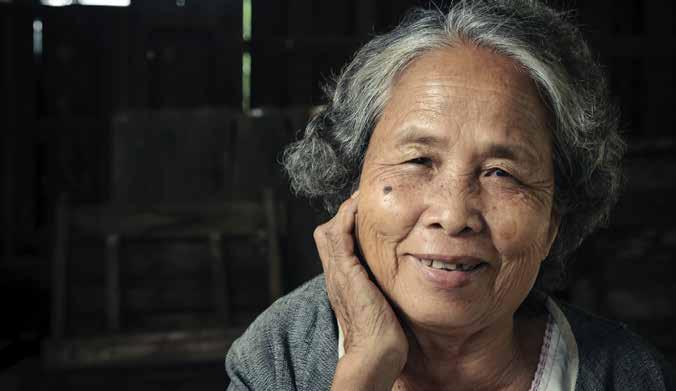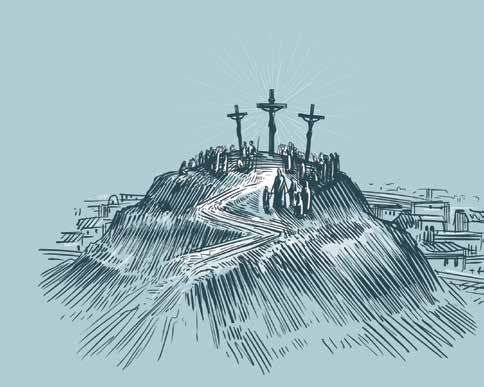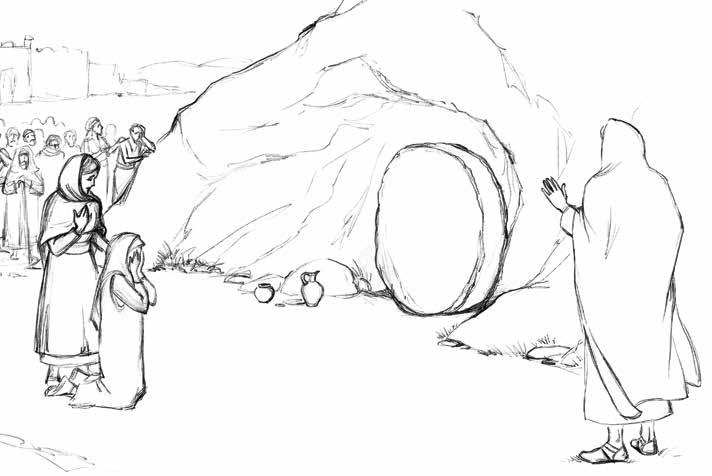THE LEMONADE CYCLE

Navigating the peaks and troughs
Different Shoes
Everyone’s experience is unique
Why Suffering?
Answers to the age-old question
The Three Siblings
The time when Jesus wept
CHANGE YOUR LIFE. CHANGE YOUR WORLD. Vol 24 • Issue 10
EDITOR’S INTRODUCTION looking for God
Throughout time, people have grappled with the question of how to reconcile the existence of evil and suffering in our lives with an all-powerful, all-knowing, and all-good God. It’s a question that has dogged philosophers across religions and cultures for millennia, as well as every human being who has ever dealt with pain, loss, or injustice and thought That’s not fair.
Several articles in this issue will examine some of the reasons why God may allow bad things to happen, but as an introduction, I’d like to take a moment to reframe the question by remembering where God is in our most painful and vulnerable times. The following story was featured in Activated several years ago, but it deserves to be quoted here in full:
A deadly coalmine explosion in northern England left scores of miners trapped underground, beyond help. The large crowd that gathered at the mouth of the mine included many relatives of the dead and dying miners.
“It is very difficult for us to understand why God should let such an awful tragedy happen,” said Doctor Handley Moule, a clergyman who was asked to speak to the crowd. “I have at home an old bookmark given me by my mother. It is woven in silk, and when I look at the wrong side of it, I see nothing but a tangled mass of threads. It looks like a big mistake! One would think that whoever made it didn’t know what she was doing. But when I turn it over and look at the right side, I see there, beautifully embroidered, the message, ‘God is love!’ We are looking at this tragedy from the wrong side. Someday we shall view it from another standpoint, and we shall understand.”
God’s Word promises that He always has a purpose and a plan in everything that comes into the lives of those who love Him.1 However, sometimes, “His ways are past finding out,”2 and we have to trust that whatever we don’t understand now, we will understand later. As the apostle Paul noted, “Now we see things imperfectly, like puzzling reflections in a mirror, but then we will see everything with perfect clarity.”2
If you are going through a difficult time at the moment, may you feel God’s love surround and protect you until He brings you out of it.
For more information on Activated , visit our website or write to us.
Website: activated.org
Email: activated@activated.org
Local contacts:
South Africa:
Tel: (082) 491 2583
Email: sales@bigthought.co.za
India:
Email: activatedindia@activated.org
Nigeria:
Cell: +234 (0) 7036963333

Email: activatednigeria@activated.org
Philippines:
Cell: (0922) 8125326
Email: activatedph@gmail.com
Editor Ronan Keane
Design Gentian Suçi
© 2023 Activated. All Rights Reserved.
All scripture quotations, unless otherwise indicated, are taken from the New King James Version®. Copyright © 1982 by Thomas Nelson. Used by permission. Other Bible quotations are from the following sources: New Living Translation (NLT).
Copyright © 1978, 1996 by Tyndale House Publishers. Used by permission. Scripture quotations marked HCSB are taken from the Holman Christian Standard Bible®, Copyright © 1999, 2000, 2002, 2003, 2009 by Holman Bible Publishers. Used by permission. New International Version (NIV). Copyright © 1978, 1984, 2011 by International Bible Society. Used by permission. Holman Christian Standard Bible®, Holman CSB®, and HCSB® are federally registered trademarks of Holman Bible Publishers. English Standard Version (ESV). Copyright © 2001 by Good News Publishers. Used by permission. Common English Bible (CEB). Copyright © 2011 by Common English Bible. Used by permission. Contemporary English Version (CEV).
Copyright © 1995 by American Bible Society. Used by permission. King James Version (KJV). Public domain.
Vol 24, Issue 10
1. See Romans 8:28. 2. Romans 11:33 3. 1 Corinthians 13:12 NLT 2
THE LEM NADE CYCLE
By Steve Hearts
When things go wrong, I just think: It’s part of the journey.
Kenny Wallace (b. 1963)
Sometimes things have to go wrong in order to go right.
Sherrilyn Kenyon (b. 1965)
Are you currently being hit with one trial, test, or difficulty after another? Are you wondering when or if things will ever start improving and getting back to normal? Do you feel exhausted, frazzled, and squeezed to the very last drop?
This is exactly how I was feeling one day not long ago—as though I was giving ceaselessly, only to have to continue doing so without any reward. I felt frazzled, spent, and empty. How can I go on? I silently pleaded. How much more can I take?
God’s response came later that day as I squeezed lemons. His voice gently whispered in my thoughts: Don’t you enjoy drinking lemonade?
Do I ever! It’s been my favorite fruit drink for as long as I can remember.
Would this favorite drink of yours be possible without squeezing each of these lemons to the last drop?
At that moment, I understood that I was somewhat like the lemons I was squeezing. God was allowing me to be squeezed by trial after trial in order to bring out the very best in me. I thought of all the times when either a song or an article was born in me as the result of some sort of experience that initially hurt, or even downright crushed me.
You have a great advantage over the lemons you are squeezing, He continued.

What’s that?
Unlike the lemons, whose skins you throw away after all the juice has been squeezed out, you are a living being who I always renew and refill once the squeezing has been completed and the best in you has been brought out.
I like to refer to this cycle of being squeezed to the last drop and then renewed and refilled as “the lemonade cycle.” This term reminds me that although what I’m going through may seem sour as a lemon, or though I may feel just like a lemon that’s being squeezed, God has a plan.


If you find yourself being “squeezed to the last drop,” take heart in the knowledge that God will renew and refill you so that you can continue to give to others. Let the “lemonade cycle” run its course, and you’ll be surprised by how far the sweetness that is being brought out in you will go.
Steve Hearts has been blind since birth. He is a writer, musician, and member of the Family International in North America. ■
3
THE SEARCH FOR MEANING

Once when I was talking to a travel agent, our conversation moved to spiritual topics and the existence of God. “I don’t believe in God,” she said. “If there is a God, why is there so much suffering in the world today? Why do thousands die of starvation every day? What kind of God would allow terrible diseases to run rampant? Why was my best friend just crippled in an automobile accident? Why didn’t He stop Hitler?”
“Those are very good questions,” I answered, “but you see, if God had put a stop to Hitler, for example, He also would have to put a stop to every other person’s free will. The Bible says, ‘All have sinned and come short of the glory of God.’1 So He would have had to prevent everybody in the whole world from doing anything wrong or
bad! From the very beginning, God would have had to step in and interfere with our free will and the majesty of personal choice that He’s given each of us to choose good or evil.”
“But wouldn’t it have been better if He had made us all to be good?” she challenged.
“If God had wanted robots, He could have made everybody only do good and love Him. But He made us with free choice and free will, so we could choose to love Him! You wouldn’t enjoy your children as much if they had no choice but to love you, would you?” I questioned.
Puzzled, she replied, “Well, no, but what does this have to do with suffering?”
I went on to explain, “Because we were put here to choose between good and evil, between God’s way or our own way, and wrong choices are the cause of all the
1. Romans 3:23
4
He knows where I am going. And when he tests me, I will come out as pure as gold.
—Job 23:10 NLT
After you have suffered for a little while, the God of all grace, the one who called you into his eternal glory in Christ Jesus, will himself restore, empower, strengthen, and establish you.
—1 Peter 5:10 CEB
Brother, beware of the smooth places on the way. If the way be rough, thank God for it. If God should always rock us in the cradle of prosperity, if we were always dandled on the knees of fortune, if there were not a few clouds in the sky, if we had not some bitter drops in the wine of this life; we should be intoxicated with pleasure, we should dream “we stand”; and stand we should, but it would be upon a pinnacle; like the man asleep upon the mast, each moment we would be in jeopardy. We bless God, then, for our afflictions. We thank Him for the changes. We extol His name for the losses. For we would feel that had He not chastened us thus, we might have become too secure.
C.H. Spurgeon (1834–1892)
suffering, misery, pain, ill health, wars, and economic troubles in the world today. Instead of choosing to love and obey God, we choose to do things our own way, and we sometimes end up suffering from the consequences of our wrong choices. The Bible tells us that ‘there is a way that seems right to a man, but in the end it leads to death.’”2
This exchange prompted me to think about how much of the world’s suffering is caused by humankind, such as the untold suffering that humankind has caused by fighting wars in which millions have been killed and maimed. Martin Luther called war “the greatest plague that can afflict humanity; it destroys religion, it destroys states, and it destroys families. Any scourge is preferable to it.”
Is God to blame for man’s wars? The Bible says, “What is the source of wars and fights among you? Don’t they come from the cravings that are at war within you?”3 God is not to blame for the suffering caused by war, but rather humankind’s greed or thirst for power, glory, and selfish gain.
In our current age, the stress and rush and tension of modern living often brings on psychosomatic diseases such as severe headaches, stomach ulcers, and heart problems. We have not learned to cast all our cares upon God, as we are advised to do in 1 Peter 5:7, so we allow our worried and harried minds to make us physically sick as we strive to keep up with the ever-increasing pace of modern society! Meanwhile, we can also make ourselves sick by smoking, drinking excessively, and taking substances that harm our minds and bodies.
2. Proverbs 14:12 NIV
5
3. James 4:1 HCSB
For another example of ways in which humankind causes suffering, look at the millions who are starving each year in some parts of our world, when there is a surplus of food in other parts of the world. God has provided more than enough so that no one need go hungry! But while surpluses are stored or destroyed in some parts of the world, the people in other nations starve.
Of course, much of the reason that millions of people around the world suffer deprivation, want, and squalor is because of the selfishness of others. If everyone shared their wealth or lands as they should, or invested it in jobs and industries to create employment, or paid living wages or fair prices for the labor and produce of the poor, there would certainly be enough to go around. God’s Word repeatedly advises and even commands those who have abundance to share with those who have not, because He doesn’t want the poor to suffer.
Lastly, we must also remember the ways God can use suffering for good in our lives. Sorrow and suffering often bring out the best in people, compassion, love, and concern for others. Suffering is meant to be a strength-giver and to equip us for giving strength to others. The Bible says, “We comfort others with the comfort we ourselves receive from God.”4 For Christians, it gives us the desire
to share the eternal solution to people’s problems and suffering—Jesus!

“Why does God allow suffering?” is one of the great questions of life. Though we can understand many of the reasons through reading God’s Word, there are some things we won’t fully understand until the next life, when we are able to see things as God sees them.
Suffering often turns people to God and inspires them to repent and seek forgiveness and ask God to save them. As King David said, “Before I was afflicted I went astray, but in my suffering I cried unto the Lord and He saved this poor man out of all his troubles.”5 Suffering and affliction can draw us closer to God.
God’s Word promises us that all the suffering for those who love God will come to an end, and He “will wipe away every tear from our eyes, and there will be no more death, nor sorrow, nor crying; and there will be no more pain, for the former things are passed away.”6
Until that perfect day, we will have to endure some suffering, but our compensation, our reward waiting for us in heaven, far outweighs the temporary pain and suffering we may experience on earth. As the apostle Paul said, “I consider that the sufferings of this present time are not worth comparing with the glory that is to be revealed to us.”7
4.
2 Corinthians 1:4 5. Psalm 18:6; 34:6; 119:67 6. Revelation 21:4 7. Romans 8:18 ESV
From an article in Treasures , published by the Family International in 1987. Adapted from the original article. ■ 6
Why suffering?
Answers to Your Questions
Q: Why does God allow suffering? Doesn’t He care about us?

A: God certainly does care! It grieves Him to see us suffer. The Bible tells us, “As a father pities his children, so the Lord pities those who fear [reverence] Him. For He knows our frame; He remembers that we are dust.”1
Jesus, too, can sympathize with our weaknesses, because He was “tempted in every way, just as we are— yet he did not sin.”2 He certainly knows what it’s like to suffer, because He was tortured and then crucified for the sins of all humankind.
Also, the Bible promises that someday all the suffering will come to an end for those who love God. In heaven, God “will wipe away every tear from their eyes; there shall be no more death, nor sorrow, nor crying. There shall be no more pain, for the former things have passed away.”3
In the meantime, God has a purpose for everything He allows to happen to us, even though we may not always see it right away. For example, difficult times can often
bring out sweetness and goodness in people. For those who do not allow themselves to become embittered or hardened by them, sorrow, sacrifice, and sadness can bring out the good things: love, tenderness, and concern for others. If we have found God’s love in Jesus, we’ll want to share that answer and that love with others, so He can ease their sufferings and help them through difficult times too.
Though we can understand many of the reasons for suffering through reading God’s Word, we won’t know all the answers to this persistent question until we get to heaven. God’s ways are not our ways, and there are some things we won’t understand until we see things as God sees them.4
The Bible also tells us, “Weeping may endure for a night, but joy comes in the morning.”5 With time we can view our suffering with a new perspective. Through it, we can become wiser and more compassionate toward others who are suffering.
And despite our limited knowledge and understanding of these deeper questions of life, there is one thing we can be sure of, and that is God’s unfailing love. We will at times be in pain or grieve, but we are not left hopeless and helpless. “I am persuaded that neither death nor life, … nor things present nor things to come, nor height nor depth, nor any other created thing, shall be able to separate us from the love of God, which is in Christ Jesus.”6 ■
1. Psalm 103:13–14
2. Hebrews 4:15 NIV
3. Revelation 21:4
4. See Isaiah 55:8–9.
5. Psalm 30:5
6. Romans 8:38–39
7
DIFFERENT SHOES
 By Caryn Phillips
By Caryn Phillips
Often our understanding of the world is limited to what we know, and our worldview has been shaped by our experience—our culture, our education, our upbringing, our socioeconomic status—as well as by our personal relationships, standards, and aspirations. When we see a man sleeping in a doorway or a woman asking for help in a slurred voice, we can tend to compare their condition with our understanding of the world. We may assume there’s something fundamentally wrong with someone in such a state.
In truth, poverty puts people in a different world. The homeless person sleeping in the doorway may not have been able to rest the night before because he was guarding his few possessions. That woman may have an untreated medical condition that affects her speech.
Chelle Thompson writes, “Human beings seldom step outside of themselves to really grasp the needs and fears of others. We often project our own thoughts and beliefs upon strangers and make judgments based upon how we think they ‘should’ be living their lives.”
Someone has suggested that to understand others, we should walk a mile in their shoes. But can I walk in the shoes of a single mother who is homeless, sick, battling an addiction to prescription drugs, and has had her children taken from her and placed in foster care? How can I possibly ever feel what she feels? I can’t walk in her shoes, but I can ask if she’d like to talk, to tell me her story, to tell me how it feels in her shoes. We may both benefit.

My friend Quentin suffers from Parkinson’s disease and has had hallucinations that frightened him and made it difficult for him to live a normal life. When he moved to a nursing home, the staff there understood his conditions, and one caregiver explained to Quentin that some brain cells were sending him false signals. This placed the fault where it belonged—on his sickness rather than on Quentin himself.
At a conference on mental health that I once attended, one speaker said, “Don’t say, ‘He’s a schizophrenic,’ but ‘He has schizophrenia.’” By the same token,
8
People take different roads seeking fulfillment and happiness. Just because they’re not on your road doesn’t mean they’ve gotten lost. H. Jackson Brown, Jr. (b. (1940–2021)
I think we have to own the fears that we have of each other, and then, in some practical way, some daily way, figure out how to see people differently than the way we were brought up to.—Alice Walker (b. 1944)
You can receive God’s love and salvation by simply praying this prayer: Dear Jesus, I believe that You love me and died for me, so I can live in heaven for eternity. Please give me Your gift of salvation, fill me with Your Holy Spirit, help me to get to know You better, and help me to share Your love with others, even those I would not ordinarily approach. Amen.
I have multiple health issues, but I don’t want to be defined by them. I don’t want to be referred to as “the sick woman.”
This perspective changes not only our words but our attitude. Can we separate the person from whatever condition afflicts them, whether it’s mental illness, drug addiction, poverty, or physical disease? Can we see who is inside and treat that person with respect? If we can look beyond appearances or assumptions, we have a chance of uncovering something good, even beautiful, beneath a rough or unattractive exterior.
When my husband and I began volunteering at a local homeless shelter, my own preconceptions melted away as I learned the reasons why this single mother or that older man was there. Often, a confluence of unfortunate events that could happen to anybody had left them with no place to live and no one to take them in.

When I asked one man what he’d done previously, he said that he’d been an auditor, “back when I was a person.” It turned out he had actually been the overseer of
a government department of auditors before depression cost him his job and, eventually, everything he had. After receiving treatment at the shelter, he found another job and now has his own home again.
The staff at the shelter politely address those staying there as Mr. or Ms. So-and-so, Sir, Miss, or Ma’am. When we show respect, we bestow dignity. Dignity helps people see themselves more positively, and that yields hope. Hope gives the will to try and keep trying. In this way, our respect can help someone find a new life.
Quentin’s severe hallucinations were found to be the result of improper medication; when the dosage was decreased, he stopped seeing so many strange events unfolding around him. He still faces challenges, but he is understood and accepted at the nursing home—and he’s happy.
Caryn Phillips does volunteer work with the homeless and others on the margins of society in the USA. ■
9
ADVERSITY = OPPORTUNITY
By Iris Richard
What can you do when the storms of life are greater than you are, when the winds and waves crash into your hopes and dreams and leave you shattered, to the point where you feel like you’ve hit a wall and there’s nowhere to turn?

Life tends to bring us into situations where we don’t choose the battle, but it chooses us! Such experiences usually present us with a choice—to fight for victory, a ray of hope, faith to overcome, or to give in to bitterness, depression, anger, or despair.
A number of years ago, out of the blue, one of our sons was diagnosed with leukemia—a knock that brought me to the edge. After nearly two years of chemotherapy came the medical conclusion that the treatment wasn’t effective and our son was losing the fight against leukemia. He was given six weeks to live. He was 16 years old.
“You’ll find closure with time,” they said. “Think positive thoughts.” “Try to keep busy.” “Find someone to talk it over with.”
I knew these were well-meaning comments, but I soon realized that continuing on autopilot, working harder, or
Your faith will be like gold that has been tested in a fire. And these trials will prove that your faith is worth much more than gold that can be destroyed. They will show that you will be given praise and honor and glory when Jesus Christ returns.—1 Peter 1:7 CEV
Hardships often prepare ordinary people for an extraordinary destiny.—C.S. Lewis (1898–1963)
trying to tuck my emotions in the furthest corner of my mind wasn’t going to help me cope. Only when I admitted that I wasn’t strong enough to heal the hurt and end the spiral of self-defeating thoughts, a ray of hope began to appear on the horizon of my despair.
I got on my knees and asked God for a strategy, a tangible plan to help me overcome. Then when the fog finally lifted, I began copying promises from the Bible in my journal or posting them on my mirror.
It was a process, but soon I experienced the healing effect of God’s Word and began to see things in a new light. Hope sprung up, and I even began to find opportunity in my adversities and losses, such as the gift of compassion for others who face loss. I believe this valley, and others like it, strengthened my faith and brought me a step closer to becoming the person God designed me to be.
Iris Richard is a counselor in Kenya, where she has been active in community and volunteer work since 1995. ■
10
FRUITS OF SUFFERING
By J.M. Stirling
We can all agree there’s no place in this world untouched by hardship and suffering. We want to believe that God is good and loving, that He sees everything and that He has the whole world in his hands. However, when evil things happen, those ideas are heavily challenged.
When I was faced once again with news of a difficult situation, my mind wandered back to when I lived for several years in the Philippines in my early twenties. When first arriving in Manila from western Canada, the differences were striking in almost every way—the heat and humidity, the throngs of people, the incessant traffic and noise, the new flavors… But what I was most shocked at was seeing real poverty for the first time. So many people I met lived with varying degrees of scarcity.
As a young missionary having to learn to do without many former conveniences, I was tempted to complain at first, but the cheerful example of the local folks encouraged me not to. For centuries, the Filipino population suffered wars and oppression at the hands of foreign interventions or local corrupt officials. They suffered for generations under the weight of poverty and broken promises, but their attitude toward life showed grit and depth that were unfamiliar to me at the time.
My wife and I later lived and worked in several other Asian countries, including affluent Japan. Our work of sharing the gospel led us to befriend both rich and poor, and at all levels of society, we found people who displayed qualities of extraordinary unselfishness and joy. We then better understood that the common denominator wasn’t economic poverty, but suffering. All had their own story of some loss that had awakened in them grace and generosity toward others.

This world has many illusions. Achievements and money are endlessly pursued, while failure is avoided and looked down upon. But life in God’s world is very different. Failure and suffering are some of the ways God uses to help us see with true perspective.
Jesus still speaks these words of promise: “Blessed are the poor in spirit: for theirs is the kingdom of heaven. Blessed are they that mourn: for they shall be comforted. Blessed are the meek: for they shall inherit the earth. Blessed are they which do hunger and thirst after righteousness: for they shall be filled. Blessed are the merciful: for they shall obtain mercy. Blessed are the pure in heart: for they shall see God.”1
J.M. Stirling and his wife Anna raised ten children while working in a Gospel ministry across seven countries. They currently live near Toronto, Canada. ■
11
1. Matthew 5:3–8 KJV
MISSED FLIGHTS
By Curtis Peter van Gorder
In the last year, my wife and I have missed three flights. In our many years of traveling, this had never happened before. It was something different each time— exhaustion and stress the first time, wrong information on our visa the second time, and a misplaced document the third time. If you’ve ever missed a flight, you know how traumatic it can be, especially when it involves getting a new visa, new tickets, and incurring not just inconvenience but added expense.

After one of those incidents, my daughter said, “Who knows what grand design might be at play here?” That proved to be true. Missing that flight led to us visiting my in-laws instead at what turned out to be a difficult time for them. One of the other missed flights resulted in us spending a few days in the Alps while we waited for the documents to be fixed—that certainly wasn’t essential, but it was a lifelong dream of mine.
That is not to minimize the physical and psychological trauma of things going awry, especially when the consequences are more serious than some inconvenience and cost. However, there’s value in taking the time to stop and
1. http://elixirmime.com
reflect on these events to see if God might be providing a silver lining—as well as what actions we can take to avoid them happening again.
When things go wrong, I often remember the African proverb: “A somersault does not separate the head from the lice.” It means that simply doing something isn’t going to solve the problem, even if it’s something that requires much effort, unless it’s the right thing to do at that time and in those circumstances. Which in my case would be to double-check my documents and foresee potential problems.
I can’t say that I won’t miss a flight again, but instead of panicking, I’ll do my part to follow the Scouts’ motto to Be prepared, or Jesus’ instruction to Watch and pray. And most importantly to stay close to my Good Shepherd who leads me to green pastures and helps me rise above my mistakes. Hopefully on my next flight I’ll hear, “Welcome aboard! Have a good journey!”
Curtis Peter van Gorder is a freelance writer and mime artist 1 who spent 47 years doing missionary activities in 10 different countries. He and his wife Pauline currently live in Germany. ■
12
THE GREATEST MOMENT
By Amy Joy Mizrany
I’ve always thought it was fitting that Jesus’ crucifixion took place on a hill. His cross was raised above the pathways and bustle. You had to travel up to it, you had to look up to see it.

And that physical metaphor mirrors the significance of Jesus’ death on the cross within history. It was the single most important act that ever occurred. Everything before that was like a slowly building crescendo, all acts of God and humans leading, pulling, pointing to this moment— His death on the cross.
It was the most unbelievably loving thing Jesus ever did. To me, it was His defining hour. He went through with it, the purpose that He had come for, that He had chosen before the foundation of the earth. He accepted the cup of pain and suffering that He desperately didn’t want, and He gave us healing of body and mind, and then restoration of our relationship with God and an eternity we now can access through His love.
It’s hard to say which moment was greater, the crucifixion or the resurrection. The resurrection was where He proved Himself to be who He said He was. It put a joyful ending on the most epic story of all time, and promised
us a sequel. And better than that, it promised that we would be the main characters in the new story He was writing. What a bright future we have now, stunning and beautiful like fresh lilies in the mist and the sun cresting over the horizon in the morning.
That’s why the cross I wear around my neck is empty. Jesus isn’t on the cross anymore, but alive and triumphant! But I still wear the symbol of His pain. Why?
Because none of that wonderful culmination would have occurred without the cross. And that’s why we believers look up to it and lift it up. Because it means more than anything ever could—it’s the price that Jesus knew your soul was worth and it’s how He bought you for His own.
That’s worth lifting up and looking up to. That’s worth the number one position in the roster of History’s Greatest Moments.
Amy Joy Mizrany was born and lives in South Africa, where she is a full-time missionary with Helping Hand and a member of the Family International. In her spare time, she plays the violin. ■
13
THE THREE SIBLINGS
By Marie Alvero
There’s a lot of pain in this world. The topic of human suffering winds its way through every period of history as we collectively try to understand its causes. Specifically, how can a good God allow suffering? To be honest, there’s no answer I’ve ever heard that made me think Oh, that totally makes sense. I’m now cool with suffering—cancer and kidnappings and poverty and war and all the other horrors! If I’m honest, every answer seems to sit on the light side of a scale that is so very weighed down with tragedy.
My younger self would hear someone ask this question of how could a good God allow such horrible things to
1. See John 11.
happen, and I would feel a wave of panic, as if me not saying the right thing would cause another person’s faith in God to die. But we all know people who, in the face of heart-rending loss, suffering, and pain have burrowed deeper into their faith and confidence in God, or even those whose sufferings have led them to God. Of course, there are others whose pain and struggle have convinced them that there is no God—or if there is, that He cares very little for the pain of His creations. I’ve learned that there are no neat answers to the question.
The story of Jesus raising Lazarus from the dead has some interesting insight.1 It begins when Jesus received word that His friend Lazarus was very sick, yet He decided to stay two more days where He was, only

14
starting back to Lazarus when he knew that Lazarus was already dead. Martha, Lazarus’ sister, rushed to meet Jesus as soon as He arrived.
“Lord,” Martha said to Jesus, “if you had been here, my brother would not have died. But I know that even now God will give you whatever you ask.”
Jesus said to her, “Your brother will rise again.”
Martha answered, “I know he will rise again in the resurrection at the last day.”
Jesus said to her, “I am the resurrection and the life. The one who believes in me will live, even though they die; and whoever lives by believing in me will never die. Do you believe this?”
“Yes, Lord,” she replied, “I believe that you are the Messiah, the Son of God, who is to come into the world.”
Then Mary comes, much more emotionally…
When Mary reached the place where Jesus was and saw him, she fell at his feet and said, “Lord, if you had been here, my brother would not have died.”
When Jesus saw her weeping, and the Jews who had come along with her also weeping, he was deeply moved in spirit and troubled. “Where have you laid him?” he asked.
“Come and see, Lord,” they replied.
Jesus wept.2
The story goes on to describe how Jesus called to Lazarus and he arose and walked out of the grave, despite having been dead for four days. Most of the onlookers were amazed, most believing that Jesus was the Messiah. But some still did not believe.
Mary’s reaction in this story is so natural, so human. She says, “Lord, if You had been here, my brother would
not have died!” She was familiar with Jesus’ ministry of healing and knew He could have saved Lazarus. “Why didn’t You come in time. If only You had, everything would be better.” I would surely have said something like this to Jesus.
What did Jesus do? He wept. He felt sensitive to their pain. Jesus already knew that He was going to raise Lazarus from the dead, because He announced it earlier in the chapter. But the pain of those He loved moved Him, and He wept with them.
The other thing that jumped out at me is that even after seeing this glorious, miraculous resurrection, some people still did not believe. This confirms to me that it’s not about how I answer this question for others, but how I answer it for myself. In this story, I see:
• Jesus taking His time
• Jesus showing up
• Jesus weeping
• Jesus intervening
We don’t have Jesus in the flesh, and a resurrection from the dead is almost never how God intervenes, but I think He still checks all these boxes.
I don’t think there’s a fully satisfying answer for how God can be both good and loving and allow the horrible suffering humanity has endured. Maybe even if He Himself explained it, we still wouldn’t understand, because we simply cannot know what He knows or see what He sees. But we can learn to trust Him, and no one can make that choice for us.
Marie Alvero is a former missionary to Africa and Mexico. She currently lives a happy, busy life with her husband and children in Central Texas, USA. ■
15
2. John 11:21–27, 32–35 NIV
From Jesus with Love
TRUST
I know your heart, and I understand everything you go through. I know that it’s hard when you feel like you’re at the very end of your rope. You feel like you don’t have the strength to face what’s ahead, to go through it and come out on the other side. Don’t worry about how you feel. Believe Me, you will come out on the other side.
I suffer with you. When your heart aches, My heart aches, for you have a High Priest that can be touched with the feeling of your infirmities.1 I ache for you! I hurt for you! This is one of those times when I take you in My arms and I carry you. I know that at these times, it’s too much to bear on your own and that you cannot go it alone, so I hold you tight and I carry you.
Out of the ashes of hurt and defeat will grow the beautiful lilies of My love—not only in your life, but in the lives of many others whom your life will touch. Only believe that I am able. Trust Me in the deep waters. Trust Me in the dark places. Know that I have gone before you and I am holding you. I will help the floodwaters not to overpower you.
 1. See Hebrews 4:15.
1. See Hebrews 4:15.









 By Caryn Phillips
By Caryn Phillips







 1. See Hebrews 4:15.
1. See Hebrews 4:15.